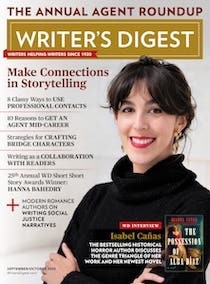This Is Never Going to Work
Today (catching up on reading), I read the New York Times story of how Reader’s Digest is trying to re-invent itself—or stay alive. A few highlights from the article: Posters…
Today (catching up on reading), I read the New York Times story of how Reader's Digest is trying to re-invent itself—or stay alive.
A few highlights from the article:
Posters in the corridors of this mostly empty building trumpet something called the FACE plan, an acronym for fast, accountable, candid and engaged. One poster offers simplistic how-tos for running a meeting. (“Ensure that the right people are at the table.”) Another is headed with the words “Vision Statement” and uses lots of empty white space to underscore the point: “We will create the world’s largest multiplatform communities based on branded content.” [my emphasis]
Look at that vision statement again: "We will create the world's largest multiplatform communities based on branded content."
What does that really mean to the everyday reader? And what Reader's Digest employee really cares about that kind of vision?
For a typical editor, it is meaningless, and probably (in private conversation) leads to ridicule among staff.
But more importantly, it begs the question, "Who the hell cares?"
Like many other media companies that own magazines, Reader's Digest is private-equity owned (like Writer's Digest's parent company, F+W Media). There is nothing wrong with that, though it can result in the kinds of changes you now see overtaking Reader's Digest.
(I have admit, I have a soft spot in my heart for Reader's Digest only because it's easily confused with Writer's Digest—and when I tell people where I work, they often misunderstand me and think "Reader's Digest.")
Another excerpt from the NY Times article:
If you hear “Reader’s Digest” and think only of a cheery, waiting-room magazine — the one with the jokes, the lists, and the homespun stories like “Nobody Cares About Grandfather’s Clock but Grandma” — well, Ms. Berner would like to have a word with you.
No amount of visioning or strategizing or Ms. Berner's arguments will change readers' minds about Reader's Digest. Readers determine who and what you are, and it takes time to change perceptions. That much I've learned in my time as publisher of Writer's Digest.
If Reader's Digest wants to change what it stands for, it's not going to happen overnight, or because Ms. Berner, through sheer force of will, wants it to. Who cares what awards you've won? Or who in the industry respects you? Readers don't know, don't care.
Another excerpt:
As Ms. Berner tries to persuade the world to rethink this company, she apparently also needs to re-educate employees. Much of her time and boundless intensity is spent prodding her staff out of its entrenched, slow-motion ways — no easy task, given the eccentric and insular culture of this company, a legacy of the long stewardship of DeWitt and Lila Wallace, the Reader’s Digest founders.
Beyond agitprop, Ms. Berner’s continuing internal campaign has included some let’s-put-on-a-show enthusiasm and some merciless cost-cutting. Lines of authority have also been redrawn, integrating the print and online realms. “Silo busting” is a phrase you hear a lot.
To lead this revolution, Ms. Berner has hired an impressively credentialed group of women to the company’s top jobs, a coterie known around the building collectively as “the blondes.” Strictly speaking, they’re not all blonde, but they have brought high-heel chic to a place that resisted, or actively shunned, that style for a long time.
I would tell Ms. Berner: Maybe instead of re-educating your employees, you should listen to them. They know your readership and potential readership. They probably know what would change the company or brand for the better, and help it survive. But are you asking them? Or do they feel threatened and bitter, and unwilling to help?
Employees are NOT averse to change. Many times employees are the first to suggest change. Most employees work because their job gives them satisfaction, and they take pride in what they do.
Are employees of Reader's Digest are any different? Of course not. They want the brand to survive as much as anyone else. Are they involved in what transformation needs to take place? Or do outsiders determine direction? Do outsiders know the target audience or community?
My prediction: Reader's Digest isn't long for this world. But maybe that's not something that can be fixed, through any amount of re-envisioning, or cost-cutting, or new leadership. Sometimes, print publications are destined to die, and Reader's Digest (the magazine) may be one of them.
Jane Friedman is a full-time entrepreneur (since 2014) and has 20 years of experience in the publishing industry. She is the co-founder of The Hot Sheet, the essential publishing industry newsletter for authors, and is the former publisher of Writer’s Digest. In addition to being a columnist with Publishers Weekly and a professor with The Great Courses, Jane maintains an award-winning blog for writers at JaneFriedman.com. Jane’s newest book is The Business of Being a Writer (University of Chicago Press, 2018).



